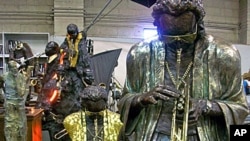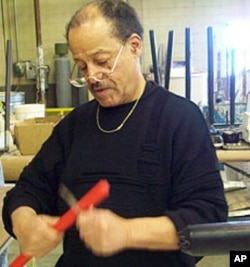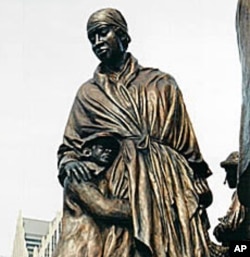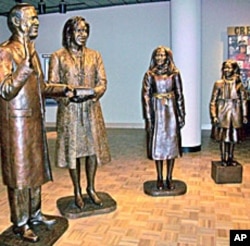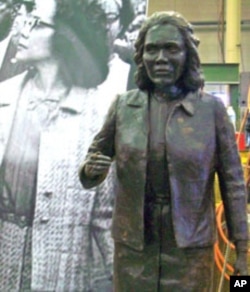Even as a child, Ed Dwight had a gift for art. But he set that talent aside to focus on careers that included engineer, test pilot, astronaut trainee (the first African American in the program) and entrepreneur.
It was as the owner of a large construction company, Dwight says, that his childhood love for creating art reawakened. "What I was doing with the construction company was just taking scrap material that was left over and I was bringing it home to my garage," he recalls. "I just taught myself to weld to make some art for my house."
A life-changing commission
The amateur artist turned professional 25 years ago, when Colorado's first African American lieutenant governor picked Ed Dwight to sculpt a major public statue.
At the time, Dwight says, he was making small flowers and other designs out of nails and scrap metal. "He asked me if I would do a sculpture of him for the capital, because they were honoring him as the first black lieutenant governor, and I told him I didn't know how to model. So he suggested I go to the library and get a book and teach myself how to weld."
So he did.
He learned to sculpt in bronze and delved into the history of African Americans. Because black history was seldom portrayed in U.S. statues, Dwight decided that his monument of the lieutenant governor would include bronzes of African American pioneers. The project won acclaim, and launched Ed Dwight's new career.
Monumental works
Today he specializes in large public monuments that chronicle African American history. Dwight creates them in a former aircraft hanger that he's converted into a studio. It's filled with clay statues, bronze casting equipment and 10,000 history books.
Waving his arm to encompass the studio, he explains, "This whole place is just filled with books and all of it's on black history. A section on music and a section on athletics and a section on all the famous sports figures and there's a whole section on black religion." The monuments Dwight has created span the entirety of African American history: from enslaved Africans arriving in America to slaves on the Underground Railroad about to escape to freedom in Canada to 20th century jazz musicians and leaders such as Martin Luther King, Jr.
Dwight says commemorating African American history this way fills an important gap for all Americans. "There's so many other people doing white American history," he points out. "So we're doing a catch-up thing." Dwight's larger-than-life statues command public spaces throughout the country and he is working on commissions for eight more memorials.
Historical sculptures
One of Dwight's latest works was just unveiled at the Colorado History Museum in Denver. It depicts President Barack Obama at his inauguration, standing with his wife and daughters. Ed Nichols, president of History Colorado, which runs the museum, says they're historically accurate, down to the box daughter Sasha stood on at the ceremony to give her a lift.
Nichols says the detail of the work illustrates how Dwight incorporates skills of his earlier careers into creating historical sculpture. "When you think about that, the engineering mind, the precision of what he has, leads to talking about the factual detail of history."
For other admirers, Ed Dwight's art shows what a person can achieve if they get encouragement, then follow through. Standing in front of the Obamas in bronze, one museum visitor mused, "I think it just shows that a lot of people have these amazing hidden talents that you just don't know. How would he have ever become this person and produced all these works if somebody hadn't just asked him?" Then she added with a laugh, "And also I thought to myself, 'My gosh, look at the things you can learn from books at the Denver Public Library.'"
High school student Meshea McCabe is also a fan of the new Obama monument. "Just to see it made me feel like I was there," she says.
The sculptor is especially happy when young people appreciate his artwork. "When these kids come through here and see stuff like this, it changes their whole perspective about what they can do. They wonder, 'Why don't I know about that and how did that woman get a statue made of her, and what can I do to have that happen to me?'"
Ed Dwight calls his latest sculpture "The Inauguration of Hope." After its debut in Denver, the piece goes on tour throughout the nation. Meanwhile, the artist turns his attention to his many other monumental projects that will bring black history to life.




